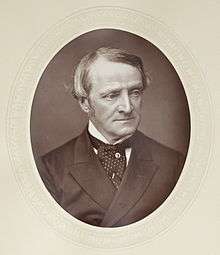Chichester Parkinson-Fortescue, 1st Baron Carlingford
| The Right Honourable The Lord Carlingford KP PC | |
|---|---|
 | |
| Lord President of the Council | |
|
In office 19 March 1883 – 24 June 1885 | |
| Monarch | Victoria |
| Prime Minister | William Ewart Gladstone |
| Preceded by | The Earl Spencer |
| Succeeded by | The Viscount Cranbrook |
| President of the Board of Trade | |
|
In office 14 January 1871 – 17 February 1874 | |
| Monarch | Victoria |
| Prime Minister | William Ewart Gladstone |
| Preceded by | John Bright |
| Succeeded by | Sir Charles Adderley |
| Personal details | |
| Born |
18 January 1823 Glyde, County Louth |
| Died |
30 January 1898 (aged 75) Marseille, France |
| Nationality | British |
| Political party | Liberal later Liberal Unionist |
| Spouse(s) |
Frances Braham (1821-1829) |
| Alma mater | Christ Church, Oxford |
Chichester Samuel Parkinson-Fortescue, 2nd Baron Clermont and 1st Baron Carlingford KP, PC (18 January 1823 – 30 January 1898), known as Chichester Fortescue until 1863 and as Chichester Parkinson-Fortescue between 1863 and 1874 and Lord Carlingford after 1874, was a British Liberal politician of the 19th century.
Background and education
Born Chichester Fortescue, Carlingford was the son of Chichester Fortescue (died 1826), Member of Parliament for Hillsborough in the Irish parliament. He came of an old Anglo-Irish family settled in Ireland since the days of Sir Faithful Fortescue (1581–1666), whose uncle, The 1st Baron Chichester, was Lord Deputy. The history of the family was written by his elder brother, Thomas Fortescue, who in 1852 was created Baron Clermont. His mother was Martha Angel, daughter of Samuel Meade Hobson. Carlingford was educated at Christ Church, Oxford, where he took a first in Classics (1844) and won the chancellor's English essay (1846).[1] In 1863, he assumed by Royal Licence the additional surname of Parkinson as heir to his aunt's husband William Parkinson Ruxton.
Political career
In 1847, Carlingford was elected to parliament for Louth as a Liberal. He became a junior Lord of the Treasury in 1854 under Lord Palmerston, a post he held until 1855, and was later Under-Secretary of State for the Colonies under Palmerston between 1857 and 1858 and 1859 and 1865. He was admitted to the Privy Council in 1864 and the following year he was made Chief Secretary for Ireland under Lord Russell, a post which he again occupied under William Ewart Gladstone from 1868 to 1871 (this time with a seat in the cabinet). In 1866, he was also admitted to the Irish Privy Council. He was then President of the Board of Trade between 1871 and 1874. The latter year he was elevated to the peerage as Baron Carlingford, of Carlingford in the County of Louth.[1]
Carlingford later served under Gladstone as Lord Privy Seal between 1881 and 1885 and as Lord President of the Council between 1883 and 1885. In 1882, he was appointed a Knight of the Order of St Patrick. He parted from Gladstone on the question of Irish Home Rule, but in earlier years he was his active supporter on Irish questions.
Personal life
Lord Carlingford married Frances Elizabeth Anne, Countess Waldegrave, daughter of John Braham, in 1863. She had been married three times before, the second time to The 7th Earl Waldegrave. There were no children from the marriage. Carlingford's influence in society was due largely to her. She died in July 1879, aged 58.[1]
In 1887, Carlingford's brother, Lord Clermont, died, and Carlingford inherited his peerage according to a special remainder, after which he was known as Lord Carlingford and Clermont.[2]
He died at Marseille, France, in January 1898, aged 75. Both his titles became extinct on his death for lack of heirs as his marriage had produced no children.[1]
References
- Attribution
 This article incorporates text from a publication now in the public domain: Chisholm, Hugh, ed. (1911). "Carlingford, Chichester Samuel Fortescue". Encyclopædia Britannica. 5 (11th ed.). Cambridge University Press.
This article incorporates text from a publication now in the public domain: Chisholm, Hugh, ed. (1911). "Carlingford, Chichester Samuel Fortescue". Encyclopædia Britannica. 5 (11th ed.). Cambridge University Press.
Sources
- Matthew, H. C. G. "Fortescue, Chichester Samuel Parkinson- , Baron Carlingford and second Baron Clermont (1823–1898)". Oxford Dictionary of National Biography (online ed.). Oxford University Press. doi:10.1093/ref:odnb/9938. (Subscription or UK public library membership required.)
 Rigg, James McMullen (1901). "Fortescue, Chichester Samuel". In Sidney Lee. Dictionary of National Biography, 1901 supplement. London: Smith, Elder & Co.
Rigg, James McMullen (1901). "Fortescue, Chichester Samuel". In Sidney Lee. Dictionary of National Biography, 1901 supplement. London: Smith, Elder & Co.
External links
| Wikimedia Commons has media related to Chichester Parkinson-Fortescue, 1st Baron Carlingford. |
- Hansard 1803–2005: contributions in Parliament by Chichester Parkinson-Fortescue